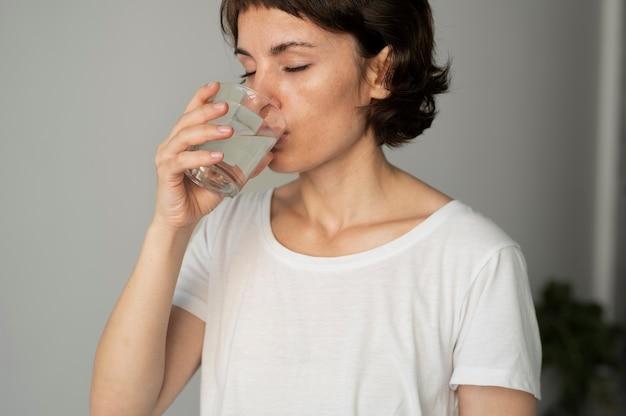Many people wonder whether increasing their water intake can affect conditions like hyperpigmentation, where the skin develops dark spots or patches. Although adequate hydration is vital for overall skin health, its direct effects on hyperpigmentation are less clear. This article will delve into the intricacies of hyperpigmentation, discuss the importance of skin hydration, and explore whether drinking more water truly offers benefits for those dealing with skin discoloration. We’ll uncover the connection between a well-hydrated body and the appearance of your skin, offering insight into effective ways to manage hyperpigmentation.
Understanding Hyperpigmentation: Causes and Common Types

Hyperpigmentation, a condition characterized by darkened areas of skin, occurs when an excess of melanin forms deposits in the skin. This can happen for a variety of reasons, including sun exposure, inflammation, hormonal changes, and even certain medications. Some common types of hyperpigmentation include melasma, characterized by brown patches, often triggered by hormonal changes; age spots, typically caused by prolonged sun exposure; and post-inflammatory hyperpigmentation, which follows skin injury or inflammation.
The Science Behind Hydration and Skin Health
Proper hydration is essential for maintaining the health and resilience of our skin. Water is crucial for various cellular functions, including nutrient delivery and waste removal. When dehydrated, the skin can become dry and more susceptible to irritation, which could potentially contribute to pigmentation issues. However, no direct scientific link confirms that drinking water reduces hyperpigmentation; instead, hydration supports the skin’s natural healing and renewal processes.
Debunking Myths: Can Drinking Water Reduce Hyperpigmentation?

The idea that drinking water can clear up hyperpigmentation is widespread, yet lacks substantial scientific backing. While staying hydrated is beneficial for overall skin health, its effect on pigmentation disorders is mainly indirect. That said, properly hydrated skin can better withstand external stressors and recover from damage, which may prevent new hyperpigmentation from forming.
| Myth | Fact |
|---|---|
| Drinking lots of water can fade dark spots. | There’s no direct evidence that water intake affects existing hyperpigmentation. |
| Dehydration causes hyperpigmentation. | Dehydration can make the skin vulnerable to damage, which may lead to hyperpigmentation. |
Complementary Strategies to Address Hyperpigmentation
To tackle hyperpigmentation effectively, consider integrating several strategies alongside proper hydration. Here are some approaches:
- Implementing a skincare routine that includes sun protection and topical treatments that address dark spots.
- Including foods in your diet that are rich in antioxidants, which can protect the skin from damage.
- Reducing stress and avoiding known triggers, such as excessive sun exposure, that can exacerbate hyperpigmentation.
Combined, these methods can help mitigate the appearance of hyperpigmentation while supporting overall skin health.
The Bigger Picture: Hydration as Part of a Holistic Approach to Hyperpigmentation
Improving hyperpigmentation often requires a multi-faceted approach. While hydration is an important aspect of skin health, it should be part of a holistic plan that includes proper skin care, diet, and lifestyle choices. Protecting your skin from the sun, using appropriate skincare products, and leading a healthy lifestyle can all contribute to reducing hyperpigmentation over time. Thus, drinking water should be seen as one piece of a larger puzzle in skin health management.
Tips for Staying Hydrated and Supporting Skin Health
Incorporate these numbered tips into your routine to ensure optimal hydration for your skin:
- Carry a water bottle and sip throughout the day to maintain hydration levels.
- Infuse your water with fruits or herbs to make it more palatable and encourage drinking.
- Eat water-rich foods like cucumbers, citrus fruits, and leafy greens to boost hydration from sources other than drinks.
Conclusion
To conclude, while increased water consumption is not a cure-all for hyperpigmentation, it plays a supportive role in maintaining skin health and resilience. Proper hydration complements other skin care strategies, helping to minimize the impact of factors that contribute to skin discoloration. As with any skin concern, for tailored advice and effective treatment options, consultation with a dermatologist is recommended.
FAQs
Q1: How much water should I drink daily to improve my hyperpigmentation?
A1: It’s key to drink at least 8-10 glasses of water daily for optimal hydration. However, individual hydration needs can vary, so listen to your body and adjust accordingly.
Q2: What other factors can contribute to the development of hyperpigmentation?
A2: Sun exposure, hormonal changes, inflammation, and certain medical conditions or procedures can all lead to hyperpigmentation.
Q3: Are there specific types of water that are better for skin health?
A3: Drinking clean and safe water is crucial; however, the effects of mineral-rich or alkaline water on skin health require further research.
Q4: Can dehydration lead to permanent hyperpigmentation?
A4: While dehydration doesn’t cause permanent hyperpigmentation directly, it can aggravate existing skin conditions and impede the healing process.
Q5: How quickly can I expect to see improvements in my hyperpigmentation from drinking water?
A5: Water consumption’s impact on hyperpigmentation is not immediate or isolated; it should be part of a broader treatment plan for the best results.
